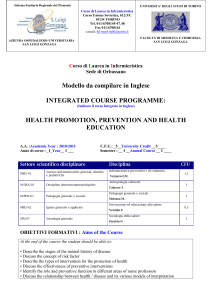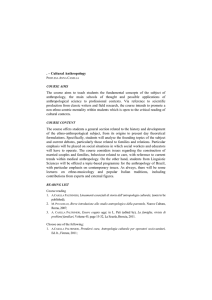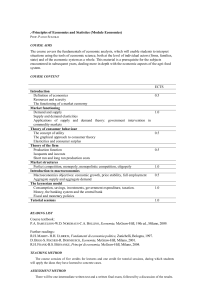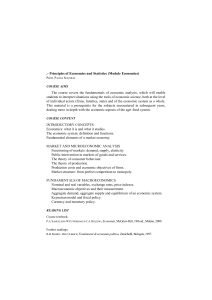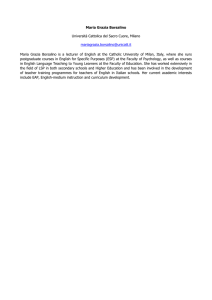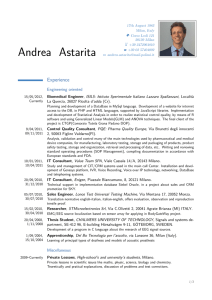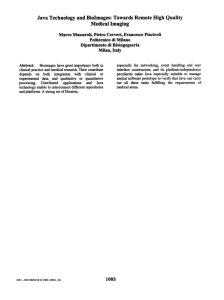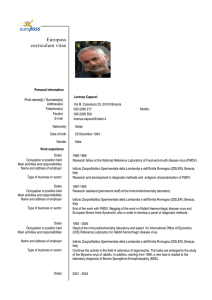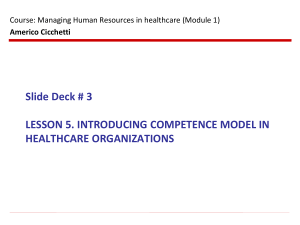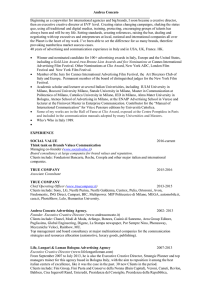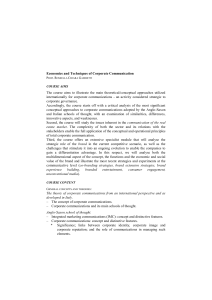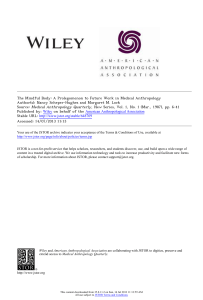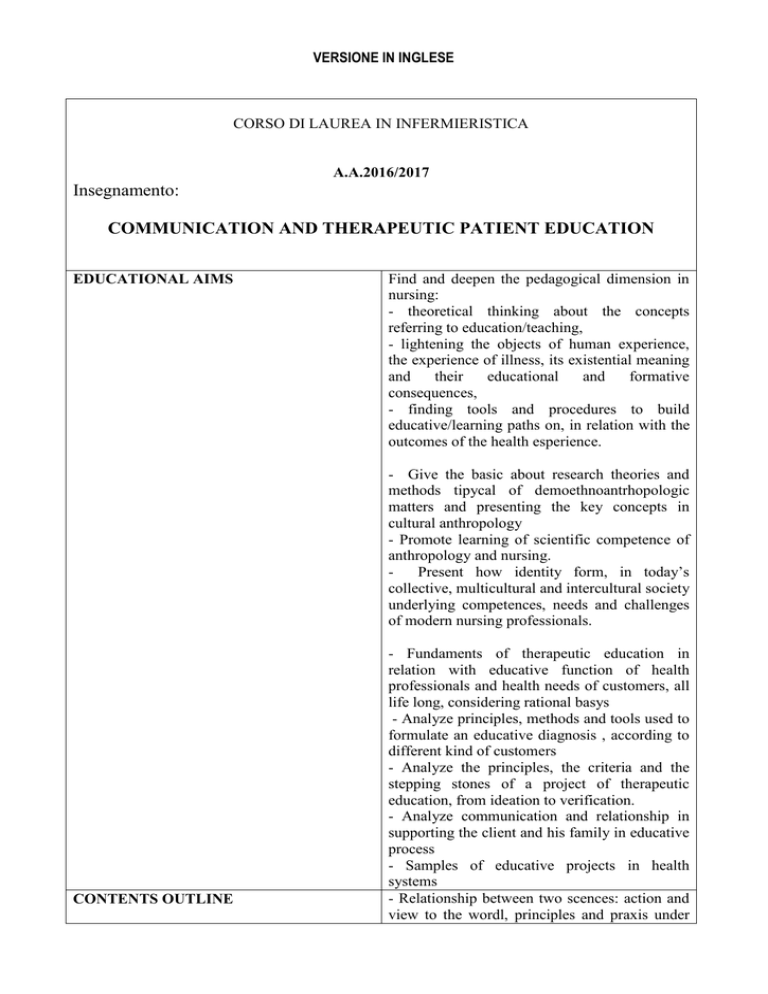
VERSIONE IN INGLESE
CORSO DI LAUREA IN INFERMIERISTICA
A.A.2016/2017
Insegnamento:
COMMUNICATION AND THERAPEUTIC PATIENT EDUCATION
EDUCATIONAL AIMS
Find and deepen the pedagogical dimension in
nursing:
- theoretical thinking about the concepts
referring to education/teaching,
- lightening the objects of human experience,
the experience of illness, its existential meaning
and
their
educational
and
formative
consequences,
- finding tools and procedures to build
educative/learning paths on, in relation with the
outcomes of the health esperience.
- Give the basic about research theories and
methods tipycal of demoethnoantrhopologic
matters and presenting the key concepts in
cultural anthropology
- Promote learning of scientific competence of
anthropology and nursing.
Present how identity form, in today’s
collective, multicultural and intercultural society
underlying competences, needs and challenges
of modern nursing professionals.
CONTENTS OUTLINE
- Fundaments of therapeutic education in
relation with educative function of health
professionals and health needs of customers, all
life long, considering rational basys
- Analyze principles, methods and tools used to
formulate an educative diagnosis , according to
different kind of customers
- Analyze the principles, the criteria and the
stepping stones of a project of therapeutic
education, from ideation to verification.
- Analyze communication and relationship in
supporting the client and his family in educative
process
- Samples of educative projects in health
systems
- Relationship between two scences: action and
view to the wordl, principles and praxis under
reflections about professional action: clinical
aspects, relationship between idiographic and
nomothetic aspects, between experience and its
narration and true illness, between material
body and trascendency.
- Analyze theoric aspects of epistemologies of
nursing
and
pedagogy,
between
understanding/interpretation and explanation:
phenomenology, hermeneutics, exixtentialism
and biosciences.
- Learning/education as a kind of sense for
nursin practice: learning as a human cultural
experience, learning/education as acquiring a
shape
- Say which are the basic cultural elements in
pedagogic and nursing thinking: the body I have
and the body I am, the cure, formative
relationship, pain, death, planning life.
- Brief description of the story of the
development of educational/learning concepts
and learning systems: humanism, activism,
behaviourism, cognitivism, lifelong learing.
- Practises and learning devices, the role of the
educator/teacher and of the learner when health
is bad
- Elements in a formative and learning project in
illness or health distortion.
- Basics of cultural and medical anthropology:
application areas (M-DEA), methods, tools, key
concepts (culture, identità, otherness, cultural
relativism, ethnocentrism)
Relations
between
cultural/medical
anthropology and nursing
- Professional ethics and ambguity of nursing
practise (symbols, competences)
- Key concepts of nursing anthropologic
literature (knowledge, belief, biomedicin/
cultural system, person, individual, holistic
approach, empathy, exotopia, advocacy,
competences and needs, habitus, way of taking
care, health/illness, cure/therapy, illness
narratives, symbolic efficacy, emotions, pain)
- Medicin & society (biopolitics and structural
violence)
Body, corporeality and nursing
(person/individual,
the
body
machine,
incorporation)
- Nurse-patien relationship
- Emotions from body and to body (pain,
con/tact – contagion; pure/impure, dirty/clean)
- Role of the body in relationships and body
techniques (proximity, remoteness, attitudes.
Meanings and symbols of a role)
Care
rituals,
acquaintance/disavowal,
supportive relationship
- Ethno-nursing and transcultural nursing:
fundamentals, problems, perspectives
- Nursing and Third Millennium challenges:
know how and relations with a foreign patient:
review of the key-concepts of illness/health, to
care/to
cure,
body/corporeality,
individual/person
- Rationals of therapeutic education: legal, ethic,
economic, social, epidemiological, professional
matters
- Educative diagnosis: basics, methods and tools
- Contract between professional and customer
- Goal defining and negotiation
- Compliance, adhesion ant their measurement
systems
- Contents design and educative methods
selection
- Assessment methods and tools about educative
process and its therapeutic outcomes
- Methods and tools in promoting relation in an
educative setting: empowerment, locus control,
counseling and so on.
LIST OF REFERENCES
- Tortolici B., Stievano A., Antropologia e
Nursing, Carocci Faber, Roma, 2006
Fantauzzi AM., Sangue migrante, Franco
Angeli, Milano, 2012
- D’Ivernois JF, Gagnayre R: Educare il
paziente. Guida all’approccio medicoterapeutico. McGraw-Hill, Milano 2007
- Auxilia F., Pontello M., Igiene e sanità
pubblica Educazione sanitaria, strategie
preventive per il paziente e comunità, Piccin,
Padova, 2012
- Benini S., Pedagogia e infermieristica in
dialogo. Per uno sviluppo delle competenze
educative, comunicative e relazionali nella
pratica assistenziale, CLUEB, Bologna, 2006
PREREQUISITES (knowledge required by the
student in advance)
None
Teaching Methods
Assessment Modality for Learning
Assessment (mark or pass/fail)
Direct classroom teaching
Analysis of case studies
Teaching in small groups
Workshops
Exam
Mark
Exam (written or oral)
Oral exam

